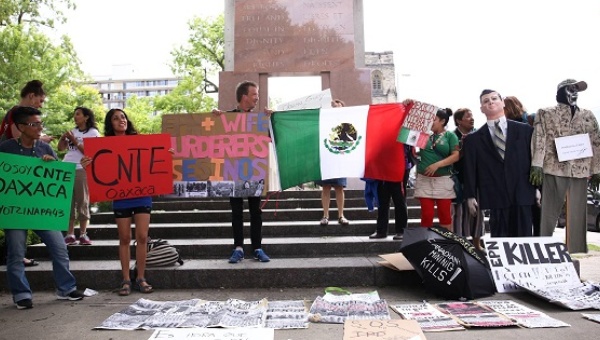
The heads of government from Mexico, Canada, and the United States gathered in Ottawa Wednesday for the “Three Amigos” Summit in order to push trade liberalization, and specifically the TPP.
Mexican President Enrique Peña Nieto, Canadian Prime Minister Justin Trudeau, and U.S. President Barack Obama were forced to defend free trade in light of renewed debate about globalization after the surprise result from the U.K. referendum that saw voters narrowly vote to leave the European Union, as well as critical comments about free trade pacts from Donald Trump, the presumptive Republican nominee for the U.S. presidency.
The three countries are already united through the North American Free Trade Agreement, better known as NAFTA. But the “Three Amigos” made a renewed pitch for the approval of another similar deal, the Trans-Pacific Partnership, or TPP.The deal is highly controversial, with opponents warning that it is designed with the interests of transnational capital in mind and will only lead to greater misery and inequality.
However, the impact of free trade agreements on workers, campesinos, and low-income people is nothing new to Mexico, which has seen poverty and inequality grow significantly in the 22 years since NAFTA came into effect.
Victor Suarez Carrera, currently in Canada to take part in demonstrations during the “Three Amigos” summit and meet and with social movements opposed to the trade deal, told teleSUR that the TPP is a “strengthened NAFTA” that “will grant more rights to transnational capital.”
Suarez, who works with the group Mexico Better Off Without the TPP, says that NAFTA should act as a warning of the impacts of these kinds of trade deals.
“Before NAFTA, Mexico was a developing country. But now it’s an underdeveloping country, with 70 percent of people in rural areas and 85 percent of the Indigenous population living in poverty,” said Suarez.
But it’s not just NAFTA that’s at fault, Peña Nieto’s neoliberal ideology, which is shared by Trudeau and Obama, has also made an impact.
Suarez says Peña Nieto’s neoliberal reforms have generated even greater social conflict.
The Peña Nieto government has been the subject of heavy criticism over its heavy-handed response to striking teachers protesting a highly controversial education reform. Police fired live ammunition against protesting teachers in the state of Oaxaca, leading to the deaths of at least nine people.
“There is a growing discontent (in Mexico) that the government answers not with with dialogue but with repression,” Suarez told teleSUR, highlighting the case of demonstrators who were gunned down by the state.
According to activist and former lawmaker, Mexico is already enduring grave human rights crisis.
Suarez warns of a coming “social explosion” if the political and economic elites continue to push neoliberal reforms and trade liberalization deals like the TPP.
“An undemocratic system that concentrates wealth in the hands of the few cannot provide answers to those who are enduring increased poverty and inequality,” Suarez told teleSUR.
The TPP is already being debated by the Mexican Congress and is considered priority legislation by the ruling PRI party and the likelihood of its approval is high.
That does not mean that the implementation of TPP is assured. Suarez says that the deal has not cleared legislative hurdles in the United States and without the U.S. the deal “won’t be approved by anyone else.”
That’s why groups like Mexico Better Off Without the TPP have been working to create links with social movements in other countries, like the U.S. and Canada, in order to coordinate a transnational response and fight the approval of the TPP wherever possible.
Suarez is also calling on the international community to condemn the government of Enrique Peña Nieto, who he says “has blood on his hands.”

